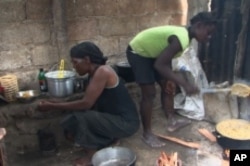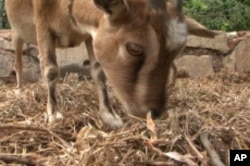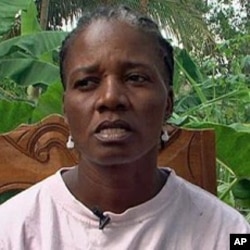Irene Guerriere's quiet, tree-lined home in Gonaives is a 100 kilometers north of the epicenter of Haiti's January 12 earthquake and a world away from the destruction in Port-au-Prince. But even here in Gonaives, her family feels the effects of the quake every day.
Following the disaster, an estimated 600,000 people fled the devastated capital and surrounding areas to seek safe haven with friends and family, such as Guerriere, in the countryside.
But the extra mouths to feed are straining their hosts' resources to the limit and pushing more people into hunger.
Helping the Haitian countryside deal with the massive influx of people displaced from the earthquake-affected areas is one of the urgent needs being addressed at a United Nations donors' conference in New York.
The conference aims to raise $11.5 billion to rebuild the nation over the next 10 years.
The search for loved ones
When she first heard about the earthquake, Guerriere says, "My first reaction was, 'I have to get to Port-au-Prince because my daughter is there. I have to find out what happened to her.'"
To her relief, she found her daughter, Ivena, safe in the company of close friends. But those friends had nowhere to go to escape the devastation. They asked to come with her back to Gonaives.
"I couldn't tell them no because they were the ones who took care of my daughter in Port-au-Prince," she says.
With that act of kindness, Guerriere's household swelled from 10 people to 18; nearly twice as many mouths to feed but no extra resources to feed them.
Food, money running out
Now, 11 weeks later, her food reserves are gone.
She is forced to sell her livestock to pay for food. And with no money for seeds, and insects attacking her crops, the next harvest is at risk as well.
"We don't have money to buy insecticide," she says. "The little money we have goes to take care of the kids."
All across Haiti, families who struggled to feed themselves before the earthquake now find themselves with hungry guests.
"The people who left Port-au-Prince brought nothing with them but their appetites," says Charles Edie, chief of agriculture for the government of Artibonite department, where Gonaives is located.
An estimated 60,000 people arrived in Artibonite alone, increasing the population by about 20 percent in a matter of days. At first, food aid helped some families ease the burden. But Edie says that first stage is coming to an end.
Wanted: jobs, schools, opportunities
The next step, Edie says, "is to try to create work so that people who left Port-au-Prince have money so they can survive."
Experts see the exodus from Port-au-Prince as a chance to ease the strains on the overcrowded capital. And the newly arrived workers actually could be a boon to rural Haiti. Putting them to work improving food production could help reduce the country's chronic hunger problems.
But people were drawn to Port-au-Prince for a number of reasons besides jobs. For the Guerriere family, the capital was also where the opportunities for a better life began. Irene Guerriere sent her daughter Ivena to high school there because there were no good schools in Gonaives.
"Port-au-Prince is where I would like to live," Ivena says, "because I want to become somebody. Port-au-Prince is where I can learn something, and I can't in Gonaives."
Urgent needs
Creating rural jobs is on everyone's to-do list, from the government to the United Nations to aid groups.
But so far only a few small projects have begun. For families like the Guerrieres, the need is urgent and it's now.
Ivena Guerriere does her best to be positive.
"Even if we eat only once, in the morning, we crack jokes all day. And we feel good."
If jobs don't come through soon, the food may run out for many Haitians. And the humor won't be far behind.












